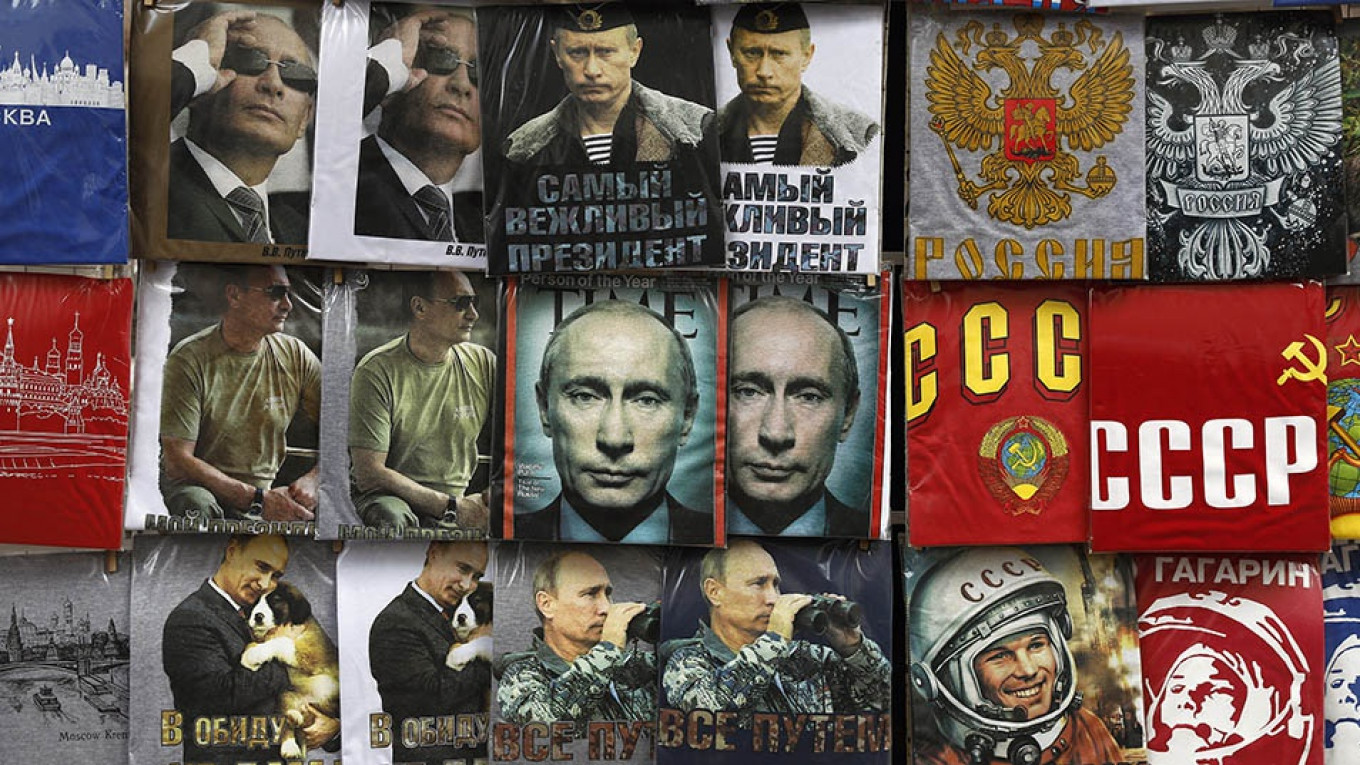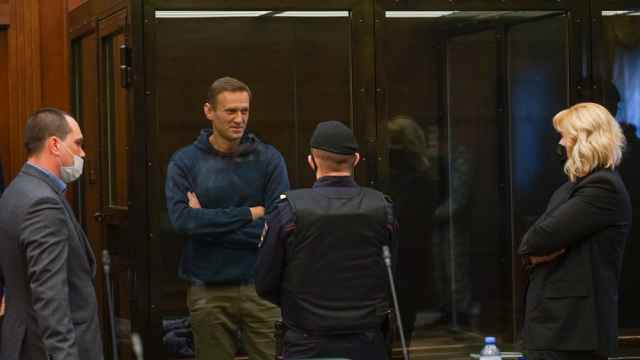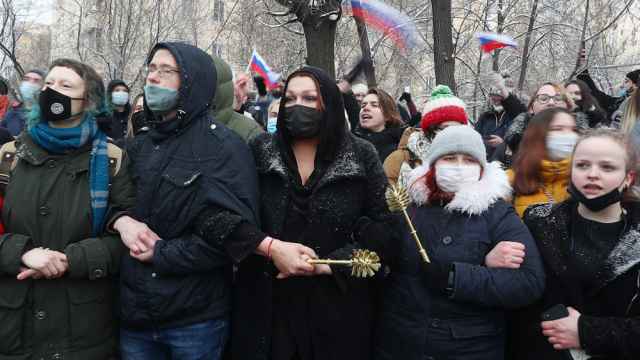Experts have long debated whether Russian propaganda — particularly on foreign policy issues — is effective. They wonder: Can state-controlled media actually force most Russians to accept the Kremlin’s version of events and ignore inconsistencies and facts that do not fit the official narrative?
At first glance, public opinion polls suggest that Russians indeed go along with the government’s official narrative. For instance, only 3 percent of those polled by the Levada Center in October blamed the Russian security services for the poisoning of former spy Sergei Skripal and his daughter Yulia in Salisbury, England. That poll was even taken after Britain released video of the two primary suspects in the poisoning — identified by the aliases Ruslan Boshirov and Alexander Petrov — walking through Salisbury and the two men’s sensational interview with Russian state media was broadcast on TV. Yet all this had little effect on Russian public opinion.
Just a small number of respondents — primarily those who get their news from independent media and live in large cities — spoke of the Russian security services’ failure in Salisbury. Most people were satisfied with the mainstream Russian narrative they heard. “Petrov and Boshirov denied the rumors of their involvement in the poisoning” was what our respondents generally said about the incident.
It is quite telling, however, that less than a quarter of respondents blamed the British for the attack on the Skripals. Instead, most chose not to answer the question directly, saying: “It could have been anyone.”
In fact, avoiding answers is how Russians typically react to any stories of Moscow’s possible interference in other states’ affairs. And it reflects the complicated relationship Russians have with their country’s political narratives and its standoff with the West.
Four years ago, when asked about the “little green men” in unmarked uniforms who popped up in Crimea, most respondents answered that “it could have been anyone.” The same was true of Russian participation in the Ukraine conflict, the presence of Russian troops in a neighboring country, and, later, Russian meddling in the 2016 U.S. presidential election. On the surface, they rejected it all.
However, their true views are probably not so simple. My colleagues and I have moderated dozens of focus group discussions over the past several years, and they present a somewhat different picture. Many respondents who hide their opinion or publicly deny Russia’s interference in other countries’ affairs, in fact, allow for these possibilities.
At the outset, focus group participants are usually reluctant to discuss these subjects. “This doesn’t interest me at all,” “this is so far away from me,” and “I couldn’t care less” were answers we initially heard about the poisoning incident. On Russian troops in Ukraine, most participants literally stated that the troops “aren’t officially present.” And they also denied the existence of a military conflict between Russia and Ukraine, as well as Russian election interference.
But when pressed to talk about the “unofficial” and “real” side of the story, a large number of people actually admitted Russian interference abroad was possible, although they were not ready to publicly discuss it.
And when a focus group moderator managed to provoke candid conversation, we could even hear about the Russian security services’ connection to the Skripal poisoning, Russian troops in eastern Ukraine and Crimea (long before the Kremlin acknowledged it) and Russian interference in U.S. elections.
All these cases reveal a vast difference between what ordinary Russians say in public and what they actually think. And fear of government retribution for speaking one’s mind doesn’t sufficiently explain why people are holding their real opinions back.
Once people overcome the internal barrier preventing them from freely expressing their views, they start speaking quite candidly. Yet they rarely express remorse or regret over the poisonings, secret foreign military operations, or election interference.
Much more frequently, their answers reflect indifference, bravado or even a willingness to automatically justify any of Russia’s actions. We recorded answers like: “Yes, it’s our troops, so what?”; “We poisoned him, so what?”; “That’s what was supposed to happen”; and “They did everything right.”
People didn’t see Russian interference as a problem in and of itself. Rather, the problem was that the country did not always manage to get away with it. Hence, the following exchange:
“You’re saying the United States is interfering in our affairs? Are we doing the same?"
“Of course!”
“But do we need to?”
“Of course we do. We just have to be careful.”
In other words, while a large number of Russians are not ready to publicly recognize their country’s interference in other states’ affairs, they have no doubts that interference indeed took place. And they see no problem with it.
In part, this attitude stems from the increasingly popular belief that Russia has regained its “great power” status, which must periodically be validated because “Russia sometimes looks unimpressive in comparison to other players.” And a number of focus group participants of different political stripes said that Russia must be tough because “that’s the only behavior the West understands.” Otherwise, “they will keep butting in.” Moreover, many Russians think their country acts “just like everybody else” when violating international norms.
As soon as the discussion turns to foreign pressure on Russia, even Russians who would otherwise be skeptical of the Russian leadership or oppose their country’s active involvement abroad side with the Russian authorities. The majority believes that Russia should never give in to foreign pressure and “roll with the punches.”
Nine out of ten respondents consider the information war that the West is allegedly waging against Russia to be an integral component of this pressure. Foreign media simply cannot be trusted under such conditions. And in this context, the Russian press gains the right to deny any fact that would portray the country in a negative light. At least a third of Russians support this approach, and that increasingly makes facts about the poisonings, troop deployments, and election interference irrelevant. To many, publicly denying the facts is the right tactic.
All this creates a contradictory picture. Most Russians are not ready to publicly recognize their country’s interference in the affairs of other states. Officially, they share the government’s position. But in less formal conversations, far more people allow for the possibility of such interference than polls show.
Does this mean that they actually agree with the Western interpretation of the events and are simply afraid to say so in public? Absolutely not. Most Russians consciously reproduce the official version of state propaganda — even if they don’t truly believe it — because they do not perceive themselves as outside observers. Rather, they feel that they are participants in the information confrontation between Russia and the West.
Denis Volkov is a sociologist at the Levada Center and columnist at the Carnegie Moscow Center where a version of this article was originally published. The views and opinions expressed in opinion pieces do not necessarily reflect the position of The Moscow Times.
A Message from The Moscow Times:
Dear readers,
We are facing unprecedented challenges. Russia's Prosecutor General's Office has designated The Moscow Times as an "undesirable" organization, criminalizing our work and putting our staff at risk of prosecution. This follows our earlier unjust labeling as a "foreign agent."
These actions are direct attempts to silence independent journalism in Russia. The authorities claim our work "discredits the decisions of the Russian leadership." We see things differently: we strive to provide accurate, unbiased reporting on Russia.
We, the journalists of The Moscow Times, refuse to be silenced. But to continue our work, we need your help.
Your support, no matter how small, makes a world of difference. If you can, please support us monthly starting from just $2. It's quick to set up, and every contribution makes a significant impact.
By supporting The Moscow Times, you're defending open, independent journalism in the face of repression. Thank you for standing with us.
Remind me later.








